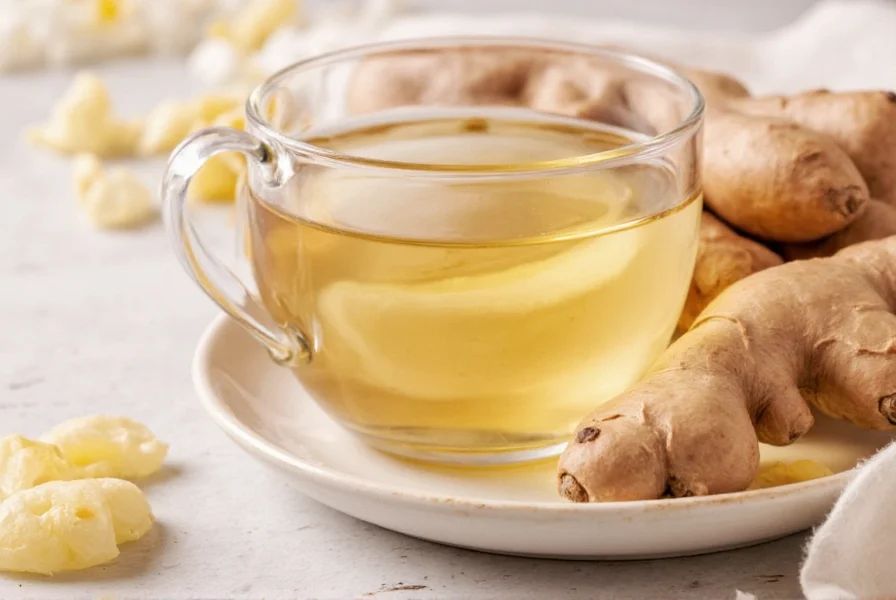For expectant mothers searching for natural remedies to combat pregnancy nausea, ginger tea often emerges as a popular option. This ancient remedy has stood the test of time, but when you're pregnant, safety becomes paramount. Let's examine what current medical research and healthcare professionals say about incorporating ginger tea into your pregnancy wellness routine.
Benefits of Ginger Tea During Pregnancy
Multiple studies have investigated ginger's effectiveness for pregnancy-related nausea and vomiting. A comprehensive review published in Nutrition Reviews analyzed several clinical trials and concluded that ginger significantly reduces nausea symptoms compared to placebo. The active compounds in ginger, particularly gingerols and shogaols, appear to work on both the digestive system and central nervous system to alleviate queasiness.
Many pregnant women report positive experiences with ginger tea for morning sickness relief. Unlike some pharmaceutical options, ginger tea offers a natural approach that many find gentler on their system. The warm, soothing nature of the tea itself can provide additional comfort during bouts of nausea.
Research-Backed Safety Guidelines
According to the American College of Obstetricians and Gynecologists (ACOG), ginger is considered a safe complementary treatment for pregnancy nausea when used appropriately. However, research indicates important parameters for safe consumption:
| Parameter | Recommended Amount | Notes |
|---|---|---|
| Daily ginger intake | Up to 1 gram | Equivalent to 1-2 standard cups of ginger tea |
| Timing | First and second trimester | Most research focuses on use during these periods |
| Preparation method | Fresh ginger infusion | Preferable to commercial blends with additives |
| Duration | Short-term use | Not recommended for continuous long-term consumption |
Potential Risks and Considerations
While generally safe, ginger tea isn't risk-free during pregnancy. Some potential concerns include:
- Blood thinning effects: Ginger may increase bleeding risk, particularly concerning before delivery or if you have a bleeding disorder
- Blood sugar impact: Ginger can lower blood sugar levels, which requires monitoring for women with gestational diabetes
- Digestive effects: Excessive consumption might cause heartburn or stomach upset
- Interaction with medications: May interact with blood thinners, diabetes medications, and certain heart medications
Pregnant women with certain conditions should exercise extra caution or avoid ginger tea altogether. These include those with a history of miscarriage, preterm labor, or clotting disorders. Women scheduled for cesarean delivery should discontinue ginger at least one week before surgery due to potential bleeding risks.

Choosing and Preparing Safe Ginger Tea
Not all ginger teas are created equal when you're pregnant. For maximum safety and effectiveness:
- Opt for fresh ginger root over commercial tea bags when possible
- Peel and slice 1/2 inch of fresh ginger root per cup of water
- Simmer in boiling water for 5-10 minutes (longer for stronger tea)
- Avoid adding excessive sugar or honey
- Check commercial blends for additional ingredients that may not be pregnancy-safe
Many women find that combining ginger tea with other soothing elements like lemon or mint enhances both the flavor and potential benefits. However, be cautious with additional herbal ingredients, as not all herbs are safe during pregnancy.
When to Consult Your Healthcare Provider
Before incorporating ginger tea into your pregnancy routine, discuss it with your obstetrician or midwife. This consultation is particularly important if:
- You're in your third trimester
- You have a high-risk pregnancy
- You're taking any prescription medications
- You've experienced previous pregnancy complications
- You're considering ginger supplements rather than tea
Your healthcare provider can help determine if ginger tea is appropriate for your specific situation and advise on the proper dosage based on your health profile.
Ginger Tea Compared to Other Nausea Remedies
When evaluating ginger tea for pregnancy nausea, it's helpful to understand how it compares to other common remedies:
- Vitamin B6: Often recommended alongside ginger for nausea relief
- Acupressure bands: Drug-free option with minimal risk
- Prescription medications: May be necessary for severe morning sickness (hyperemesis gravidarum)
- Peppermint tea: Soothing but may worsen heartburn for some women
Many healthcare providers recommend starting with ginger tea as a first-line natural remedy before progressing to stronger interventions. The combination of ginger tea with dietary modifications (small, frequent meals) often provides significant relief for mild to moderate pregnancy nausea.
Practical Tips for Using Ginger Tea Safely
For pregnant women who receive medical clearance to use ginger tea:
- Start with small amounts (1/4 to 1/2 cup) to assess tolerance
- Consume between meals rather than with food
- Drink while warm but not scalding hot
- Track your intake to ensure you don't exceed 1 gram of ginger daily
- Stop use immediately if you experience unusual symptoms
Final Considerations
Ginger tea represents one of the better-researched natural remedies for pregnancy nausea, but it's not a universal solution. Every pregnancy is unique, and what works for one woman might not work for another. The key is moderation, medical consultation, and careful monitoring of your body's response.
Remember that severe or persistent nausea and vomiting during pregnancy (hyperemesis gravidarum) requires medical attention beyond home remedies. If you're unable to keep fluids down or experience weight loss, contact your healthcare provider immediately.
How much ginger tea can I safely drink while pregnant?
Most healthcare providers recommend limiting ginger tea to 1-2 cups daily, providing no more than 1 gram of ginger. This amount has been shown to be effective for nausea relief while minimizing potential risks. Exceeding this amount may increase the risk of side effects without providing additional benefits.
Can ginger tea cause miscarriage in early pregnancy?
Current research does not indicate that moderate ginger tea consumption causes miscarriage. Multiple studies have examined ginger use during pregnancy without finding increased miscarriage risk at recommended doses. However, women with a history of miscarriage or threatened miscarriage should consult their healthcare provider before using ginger.
Is it safe to drink ginger tea during the third trimester?
Ginger tea is generally considered safe throughout pregnancy when consumed in moderation. However, some healthcare providers recommend reducing or discontinuing ginger intake during the final weeks before delivery due to potential blood-thinning effects. Always discuss continued use with your obstetrician as your due date approaches.
What are the signs I should stop drinking ginger tea during pregnancy?
Stop using ginger tea and contact your healthcare provider if you experience unusual heartburn, mouth irritation, increased bleeding, or any other concerning symptoms. Women with gestational diabetes should monitor blood sugar levels closely, as ginger can affect glucose levels. If you're scheduled for surgery, discontinue ginger at least one week beforehand.
Can I use ginger tea instead of prescription medication for morning sickness?
For mild to moderate nausea, ginger tea may provide sufficient relief without prescription medication. However, severe morning sickness (hyperemesis gravidarum) often requires medical treatment. Many healthcare providers recommend trying ginger tea as a first-line approach, but you should consult your doctor if natural remedies don't provide adequate relief or if you're unable to keep food and fluids down.











 浙公网安备
33010002000092号
浙公网安备
33010002000092号 浙B2-20120091-4
浙B2-20120091-4